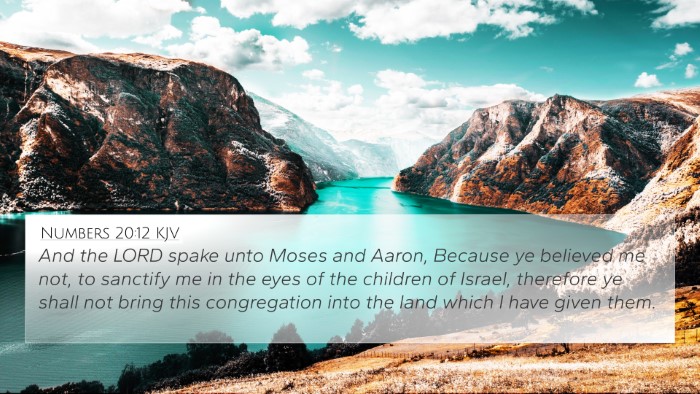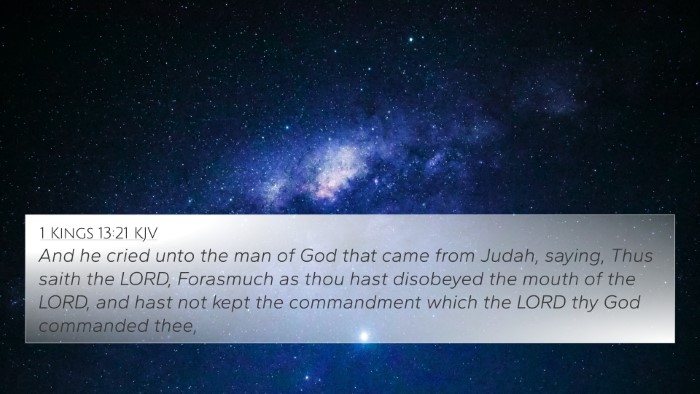Understanding 1 Chronicles 21:10
1 Chronicles 21:10 presents a significant moment in the narrative of King David's reign, where God commands him to "Go and tell David, saying, Thus saith the Lord, I offer thee three things: choose thee one of them, that I may do it unto thee." This verse captures themes such as divine judgment, the importance of humility, and the gravity of choices influenced by God.
Verse Context
This verse follows a pivotal incident where David conducts a census of Israel, leading to God's displeasure. The verse illustrates God communicating His consequences for this action, emphasizing the consequential nature of sin and the necessity for repentance.
Commentary Insights
Several public domain commentaries provide valuable insights into the meaning and implications of this verse:
-
Matthew Henry's Commentary:
Henry notes that God’s offer to David reflects His mercy and willingness to engage with humanity regarding their sins. It underscores the importance of choices and the consequences of one’s decisions.
-
Albert Barnes’ Notes:
Barnes elaborates on the seriousness of David’s sin by conducting a census, suggesting that it signifies a lack of trust in God’s provision and sovereignty. God’s response conveys that judgment is inevitable and serves as a reminder of the weight of leadership.
-
Adam Clarke's Commentary:
Clarke interprets God's message as a way to humble David, emphasizing that true kingship operates under divine authority. The choices imposed upon David serve to teach him a lesson on accountability and faithfulness.
Thematic Connections and Cross-References
This verse links to several others in the Bible, providing a broader understanding of its themes:
- 2 Samuel 24:12: shows God giving David the same choices regarding punishment.
- 1 Chronicles 10:13-14: discusses God’s displeasure with Saul, making it clear that lasting leadership requires obedience to Him.
- Psalms 51:4: highlights the importance of acknowledging one’s sins before God, suggesting a theme of repentance relevant to David's situation.
- Proverbs 16:9: reinforces the idea that while humans plan their paths, it is the Lord's purpose that prevails, linking back to the ramifications of David’s choice.
- James 4:10: encourages humility before the Lord—a fitting reminder of how David must respond to God's offer.
- Hebrews 12:6: discusses the Lord’s discipline, relating to the divine consequences David faced for his census.
- Romans 14:12: reflects on personal accountability before God, resonating with the choices David had to make.
Conclusion
In summary, 1 Chronicles 21:10 conveys a powerful message about divine judgement, the significance of human choices, and the need for humility before God. The insights from public domain commentaries such as those by Matthew Henry, Albert Barnes, and Adam Clarke not only enhance understanding but also position this verse within the larger narrative of scripture. The thematic connections and cross-references highlighted invite deeper exploration of related scriptures, enriching personal Bible study and enhancing comprehension of biblical principles.
Cross-Referencing Insights
Utilizing tools for Bible cross-referencing, such as a Bible concordance or a cross-reference Bible study guide, can unveil deeper insights into 1 Chronicles 21:10. By understanding how various scriptures interact, believers can enhance their spiritual knowledge and discover themes that resonate throughout the biblical text.
- Cross-reference Bible study methodologies: Developing a systematic approach can yield valuable insights and enhance personal study.
- Bible chains references: Following references can demonstrate connections across the Old and New Testament.
Final Reflection
As we reflect on 1 Chronicles 21:10 and its implications, we must consider how this verse relates to our own lives. It reminds us of the importance of our choices, the need to acknowledge our sins, and the grace that is available to us through repentance. In a world filled with decisions that can lead us away or towards God, this verse is a crucial reminder of the significance of divine guidance and the importance of a humble heart.









